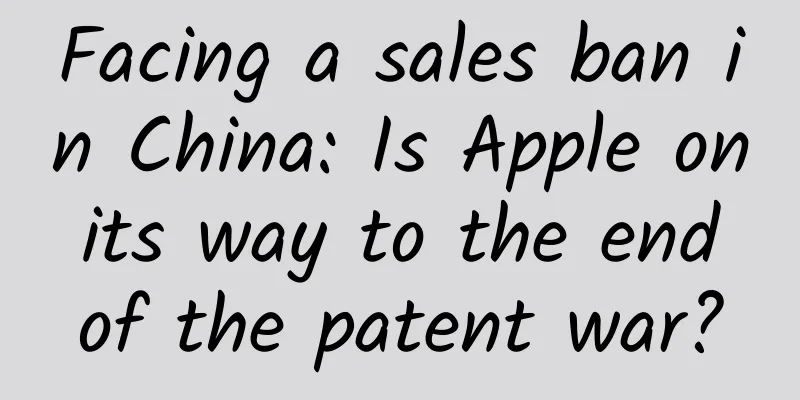Facing a sales ban in China: Is Apple on its way to the end of the patent war?

|
On the evening of December 10th, Beijing time, Qualcomm announced that the Fuzhou Intermediate People's Court had approved two interim injunctions filed by Qualcomm against Apple's four Chinese subsidiaries, requiring them to immediately stop infringing on Qualcomm's two patents, including importing, selling, and promising to sell unauthorized products in China. The two patents involved in this case are:
Qualcomm said that the two patents have been recognized as valid by the State Intellectual Property Office of the People's Republic of China during the patent invalidation procedure. The products covered by the relevant patents include: iPhone 6S, iPhone 6S Plus, iPhone 7, iPhone 7 Plus, iPhone 8, iPhone 8 Plus and iPhone X. This means that the above-mentioned Apple product models will face a sales ban in China from now on. 1 The China Business News reported that Apple responded by saying that this was "another desperate move by Qualcomm to try to ban the sale of our products," that "Chinese consumers can still buy all models of iPhone products," and that "we will pursue all legal avenues through the courts." According to Yahoo Finance, Apple said that iOS 12 changes the way users resize photos and manage apps on the screen, so Apple can bypass Qualcomm's patent through system upgrades. According to CNBC, Apple has filed for an appeal, hoping to overturn the ban on iPhone sales in China. On the evening of December 10, related products were still on sale at Apple’s own store on JD.com. But in fact, Apple's situation may not be as optimistic as it imagines. According to current Chinese laws and regulations, a "temporary injunction during litigation" is a preservation act that provides temporary protection to the applicant to protect the applicant's legitimate rights and interests and stop the infringer's infringement after the court finds that the infringer has committed an infringement (Apple has infringed Qualcomm's patent). If Apple is dissatisfied with the ruling, it can also file an application for reconsideration within the next 10 days and make a reasonable defense. However, it can be executed immediately after the ruling is delivered, and even if Apple files for reconsideration, it will not affect the execution of the ban. This means that Apple cannot delay the implementation of the ban through means such as review. At the same time, Qualcomm stated that system upgrades do not affect the enforcement of the ban because Apple's infringement occurred first, and the court's ban is also aimed at mobile phone models, not the operating system installed on the phone. "If Apple violates these orders, Qualcomm will enforce them through the enforcement tribunals of the Chinese courts," said Don Rosenberg, Qualcomm's general counsel and executive vice president. At the same time, according to Article 313 of the Criminal Law of the People's Republic of China, if a person has the ability to execute the judgment or ruling of the People's Court but refuses to do so, and the circumstances are serious, he shall be punished with fixed-term imprisonment, detention or a fine. "In the past, it was not common for Chinese judges to approve injunctions," said Matthew Dresden, an international intellectual property lawyer at Seattle law firm Harris Bricken. China lacks a strong agency like the U.S. Marshals Service, so government agencies such as Chinese Customs and the Administration for Industry and Commerce need to participate in the enforcement to ensure that the injunction is effectively enforced. But it can be noted that China's protection of intellectual property rights is continuing to strengthen. Just this month, the National Development and Reform Commission and 38 other ministries and commissions have just signed the "Memorandum of Cooperation on Joint Punishment of Serious Dishonest Subjects in the Intellectual Property (Patent) Field", which will impose 33 cross-departmental joint punishments on six major categories of serious dishonest behaviors in the intellectual property (patent) field, such as repeated patent infringement and failure to enforce the law, including recording them in the credit reporting system, refusing to accept corporate bond issuance, and restricting the establishment of financial institutions. It would be interesting if Apple became the first target of this memorandum. 2 Prior to this, the patent war between Apple and Qualcomm had lasted for nearly two years. Since January 2017, Apple has filed lawsuits in the United States, China, the United Kingdom, Germany and other countries and regions around the world, accusing Qualcomm of "maliciously collecting patent fees", and announced in April of the same year that it would stop paying patent fees to Qualcomm. This year, Apple's new generation of iPhones completely abandoned Qualcomm's baseband chips. At a court hearing in late October 2018, Qualcomm said Apple owed it $7 billion in patent royalties. Since April 2017, Qualcomm has also launched a comprehensive counterclaim against Apple in the United States, China and other countries and regions. To date, the patent war between the two sides has spread to 6 countries and 16 jurisdictions around the world, with more than 50 lawsuits, and most of them are still under trial. Earlier this month, Qualcomm CEO Steve Mollenkopf and President Cristiano Amon both hinted publicly that the patent lawsuit between Qualcomm and Apple "is about to find a solution in some way." Generally speaking, such statements in a fierce dispute are either a buffer before giving in or a clarion call before launching a general offensive. It now appears that Qualcomm is clearly the latter. According to Qualcomm, several judicial institutions in China and other jurisdictions around the world are also reviewing similar relief requests. Therefore, Apple may face similar bans in more markets in the future. 3 Apple has always maintained a tough attitude towards Qualcomm's statement. In November this year, Reuters reported, citing people familiar with the matter, that Apple had not negotiated at any level to resolve the legal dispute with Qualcomm. "We have absolutely no meaningful discussions with Qualcomm and have not reached any agreement. We are preparing for the trial." However, the reality is that the situation Apple is facing is becoming increasingly dangerous. Data from market research firm Counterpoint shows that by the third quarter of this year, Apple's shipment share had dropped to 12%, lower than Samsung's 19% and Huawei's 14%. In the fourth quarter, sales of Apple's flagship products, iPhone and iPad, were far below market expectations. The market performance of the three new products, iPhoneXs, iPhoneXsMax, and iPhoneXR, also showed poor reputation and sales. For example, the new version of iPhone XS was exposed, and the "signal gate" problem from the iPhone 4 era reappeared. Correspondingly, Chinese mobile phone brands such as OnePlus, Xiaomi, OPPO, and vivo, which use Qualcomm basebands and antennas, have very good user experience in their new products, and their shipments and market share have continued to grow. Last month and this month, Qualcomm announced the launch of the QTM052 millimeter wave antenna module for 5G and the world's first commercial 5G mobile platform Snapdragon 855. This means that the gap between the iPhone and other mobile phones in communication performance will be further widened in 2019. In the supply chain, there are reports that Apple has cut orders for parts supply chains for the new iPhone. Due to the cuts, Foxconn and other Apple upstream and downstream manufacturers have issued profit warnings. For example, the Nikkei News reported that Foxconn initially prepared nearly 60 production lines for the iPhone XR, but recently only about 45 of them have been put into use, with a daily reduction in production of about 100,000 units. Previously, Apple had authorized operators in markets such as Japan to reduce the price of the iPhone XR, which had only been on sale for a month. This was completely unimaginable in previous years. In the capital market, Apple's fall has become a consensus. From October 3 this year to now, in just two months, Apple's stock price has fallen from its highest point of US$232.74 to US$164.9, a drop of nearly 30%. At present, many securities companies have lowered their expectations for Apple or even "abandoned" Apple. For example, the Swiss National Bank has sold more than 1 million shares of Apple in the third quarter of this year. 4 Now, after being banned from the Chinese market, Apple's situation will be even worse. According to the fourth quarter financial report data, the Chinese market contributed more than 18% to Apple's revenue. Since Qualcomm filed the relevant infringement lawsuit with the Fuzhou Intermediate People's Court at the end of 2017, Apple had not yet released the iPhoneXs, iPhoneXsMax, and iPhoneXR at that time, so these three new products that were only launched this year are not included in the scope of this ban. Despite this, the previous generation of products still contributes a considerable amount to Apple's revenue - especially when new products are expensive and have frequent problems, more users would rather choose to buy previous generation products or switch to other Android brands. Will this be the final straw for Apple? It is worth noting that Apple had previously had patent disputes with Nokia, but reached a "lightning settlement" with it in 2017. According to Li Junhui, a special researcher at the Intellectual Property Research Center of China University of Political Science and Law, Nokia does not rule out obtaining a "sales ban" in some of its lawsuits against Apple, which may be one of the key reasons for forcing Apple to reach a settlement with it. The industry also generally believes that if a settlement is reached with Qualcomm, although Apple will have to pay patent fees, it will also help Apple to make up for its shortcomings in the baseband and antenna areas, improve product competitiveness, and restore its already shaky market reputation. "If it's delayed another year or two, even if Apple wants to turn back, it might be too late," said an industry insider. 5 Finally, by the way, about a month ago, I made a prediction (once again, there is absolutely no insider information, just my personal judgment and guess based on my understanding of the industry situation): At that time, a friend wanted to bet with me... Now it seems that my chances of winning are relatively high? |
<<: Fingerprint, face, iris, which one is the best in AI mobile phone identity recognition?
Recommend
How to establish a user incentive system to enhance user stickiness?
Most mature apps now have a similar membership sy...
8 steps to create persuasive copywriting
All advertising copy is just for change. Change c...
What makes Apple users so loyal? What can Chinese smartphones learn from?
In the field of smart phones, iPhone user loyalty...
How to do a good job in event operation planning process?
The essence of an event is communication, but the...
Touch Technology helps the completion of the "Xiamen Game Innovation Center Project"
On May 15, 2015, the Jimei District Government of...
B-side operations: How to acquire customers through activities?
For B-side products, holding events to acquire cu...
Financial product operations: 4 key conversion funnels you must know
People tend to be wary of financial products. Aft...
Chen Chao: 60 Inventions That Influenced the World
Chen Chao · "60 Great Inventions That Influe...
It is becoming increasingly difficult to flash a mobile phone. What should Android users do?
Since the birth of Android phones, flashing has a...
How to play Douyin shop: One article explains in detail how to play small shop with no source, small shop group, and self-broadcasting!
When playing Douyin store , there are ways to pla...
Kuaishou advertising account opening, prices and advantages!
Kuaishou - "Record the world, record you&quo...
Xiaohongshu traffic trends in 2022!
In Xiaohongshu, I think identity types can be rou...
Military Advisor's Mansion Liu Jinyi Yin Pan Qi Men Elementary and Intermediate Class
Resource introduction of Liu Jinyi's Yin Pan ...
Seven techniques for choosing titles, 24 case studies
1. The first-person perspective is what I see, wh...
CITIC Securities 2021 Research Methods Training (Shanghai Station)
CITIC Securities 2021 Research Methods Training (...
![[Hui Says English] The fifth session of the one-stop English listening and speaking training camp](/upload/images/67cbff5f0e9ad.webp)








